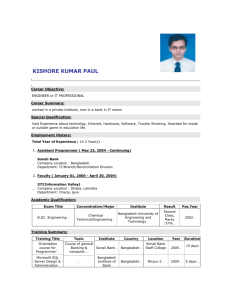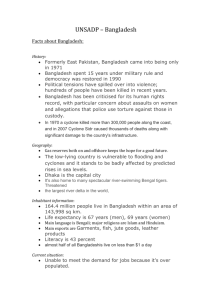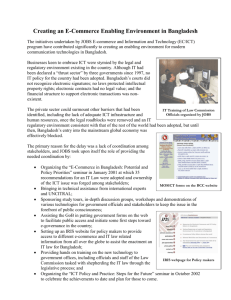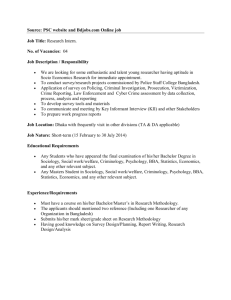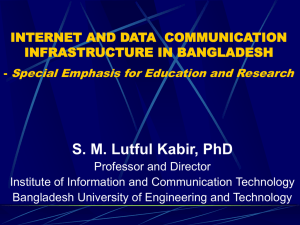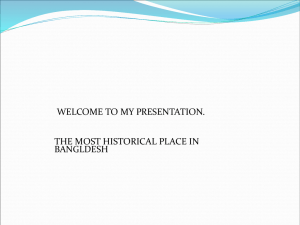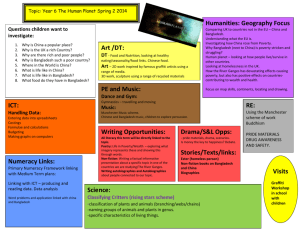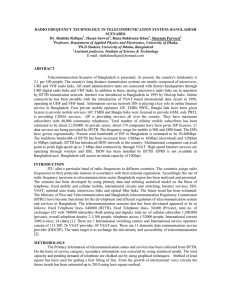advertisement
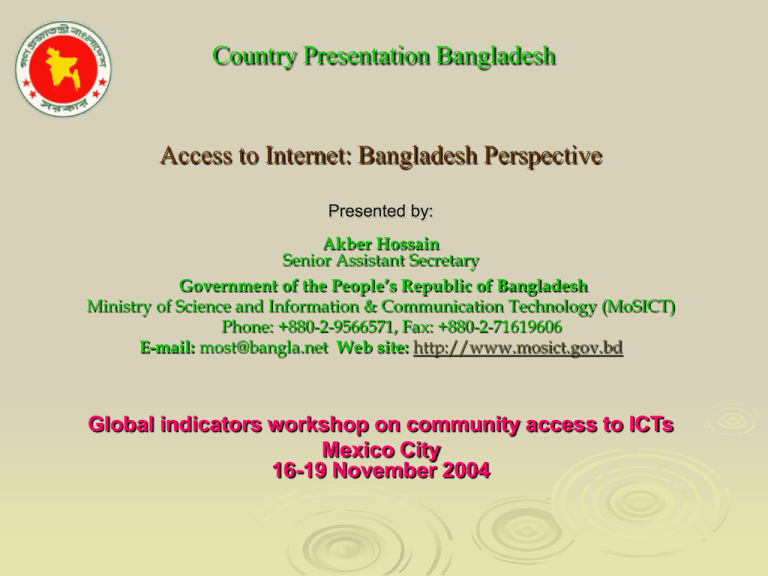
Country Presentation Bangladesh Access to Internet: Bangladesh Perspective Presented by: Akber Hossain Senior Assistant Secretary Government of the People’s Republic of Bangladesh Ministry of Science and Information & Communication Technology (MoSICT) Phone: +880-2-9566571, Fax: +880-2-71619606 E-mail: most@bangla.net Web site: http://www.mosict.gov.bd Global indicators workshop on community access to ICTs Mexico City 16-19 November 2004 Country Profile 1. Area : 144000 Sq.Km 2. Population : 123.15* Million 3. Population density : about 880/ sq. Km. 4. Divisions :6 5. Districts : 64 6. Sub Districts (Upazila) : 465 7. Unions (rural) : 4484 8. Villages (rural) : 87319 9. Municipalities (urban ) : 223 10. City Corporation :6 11.Per capita GDP : About USD 346 * Source: Population Census 2001 Telecom Infrastructure in Bangladesh Fixed line Telephone : 0.83 Million, (digital: 0.79 M) (Public Sector) Digitalized District : 64 Digitalized Sub district : 165 ( out of 465, 100% Coverage will be within 2005) Mobile Telephone : 3.00 Million (Private Sector Teledensity : 2.90 line per 100 people (PSTN & Mobile) Bangladesh Telecommunication Regulatory Commission established in 2002 Telephone call charge reduced significantly Recently fixed line phone sector has been opened for private sector investment. Mobile telecoverage reaches most of the rural areas 82000 Grameen Phone serving remotest areas Recently VOIP legalized Telecom Infrastructure in Bangladesh contd.. 1800 KM fibre optic cable under Bangladesh Railway is being utilizad by the private mobile telephone operator Fibre optic link between few districts existing under BTTB Packet Switching Exchange in 9 big District HQ established for data communication by BTTB Etablishment BTTB’s of DDN Node in 17 district under progress 1 million mobile phone project is yet to be implemented in 2005 Fibre optic link between all district is planned by BTTB Internet First introduced in 1996 Number of ISPs : 159 ( 64 are actively providing services) 80% ISPs are located at capital Dhaka Government owned Bangladesh Telegraph and Telephone Board (BTTB) has extended ISP services to all 64 district HQ and 165 Sub district HQ out of 465 ISP Subscriber : 0.2 Million(10% are broad band available only at Dhaka and Chittagong City area and rest are dial up) Number of Internet users 2 Million Bandwidth range: Dial up-32kbps to 56 kbps, BB-64kbps to 8 mbps Technology uses: VSAT Submarine cable yet to be connected in 2005 PC Penetration rate is very low: 1.5 Sets /1000 Peoples Internet connection slow and costly, not affordable by general people Establishment of Internet Exchange is under implementation Internet in rural areas Villages and Unions where 80% of the rural peoples lives are still out of reach of internet facilities In a very few places of these rural areas some NGOs are working for internet connectivity, such as: Grameen communication (ISP) Village e-mail Services Village internet Program Village cyber kiosk www.grameen-info.org/gc Grameen Shakti (ISP) Village e-mail Services Village internet Program www.gshakti.com Community e-Centres At present Government do not have any Community e-Centres program Ministry of Science and ICT has taken a program to set up few centres as pilot basis in cooperation with ADB and Commonwealth Secretariat. Some NGOs and SDNP of UNDP has setup very few centres where access to internet by community available Cyber Cafes are working as Community e- Centres Approximately 500 Cyber Cafes are in operation, most of them are located at Dhaka and Chittagong City Some are in other District HQ A very few are in the Sub district level ICT in Bangladesh ICT has been declared as the thrust sector by the Government. A National ICT Task Force, headed by the Honorable Prime Minister herself leads the ICT initiatives in the country. National ICT Policy 2002 This Policy aims at building an ICT-driven nation comprising of knowledge-based society by the year 2006. In view of this, a country-wide ICTinfrastructure will be developed to ensure access to information by every citizen to facilitate empowerment of people and enhance democratic values and norms for sustainable economic development by using the infrastructure for human resources development, governance, e-commerce, banking, public utility services and all sorts of on-line ICT-enabled services. Policy Statements regarding community access to the internet (3.2.16 )The Internet facility will be extended to all the district headquarters and subsequently to its adjacent areas upto Subdistrict levels. Internet will be provided to the educational institutions and libraries.To ensure public access to information, Cyber Kiosks will be set up in all Post offices, Union complex and Upzila complex. Private sector participation will be encouraged to set up these facilities. (3.2.17) Indicators of Community Access No authenticated surveys has been done so far to asses the needs of community to access to the internet. As per ITU Digital Access Index 2002 the position of Bangladesh is 0.18 Major government efforts are in the field of Infrastructure development and HRD in ICT Common peoples, specially the young, are very much enthusiastic to the access to the internet 1st Bangladesh Internet Fair in April 2004 conducted by the ISP Association of Bangladesh proved the interest of the common people Number of internet subscribers as well as users of internet cafes are increasing significantly during recent past. About Questionnaire Indicators used in the questionnaire are not fully appropriate for a LDC like Bangladesh though the indicators are well defined Necessary/authenticated data are not available in the country Questions regarding number of Cyber Cafes, number of internet connections in Educational Institutions, number of Community e-Centres and number of users etc may be added for easy understanding of the questionnaire. Positive Steps towards Computerization Exemption of tax on Computer items Distribution of computers to schools Computerization of government offices Launching of websites of government, (e.g. www.bangladesh.gov.bd) Ministries/Divisions Legislature, Judiciary and Local Government institutions Abolition of state monopoly in Telecom Use of Computers at the sub-district level Constrains For Development Of ICT Sector in Bangladesh Low compute penetration Low teledensity Internet access show and expensive Bangla interface lacking Weak data communication infrastructure Absence of legal infrastructure • No law against cyber crime •No law of electronic authentication •No electronic certification authority Lack of public awareness about ICTs Lack of adequate human resource Brain Drain Welcome Comments, Questions . . . . Thanks . . . . .

